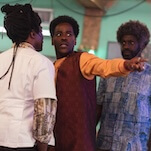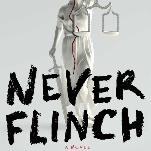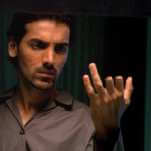The Coen brothers fulfill an important role in American society: They fuck with us. They’re tricksters who’ve made it into the upper echelon of American film without ever losing, or even compromising, their simultaneously admirable and maddening eagerness to fuck with audiences, critics, interviewers, and the world as a whole. To borrow Matt Groening’s take on the role The Simpsons played early in its run, the Coen brothers are Bugs Bunny to the world’s perpetually apoplectic Yosemite Sam.
This helps explain the frustrated, exasperated response many of their films receive. After the breakthrough success of Fargo, for example, it seemed downright perverse to make a featherweight, Sam Elliott-narrated stoner comedy like The Big Lebowski, which essentially re-imagined Philip Marlowe as a bathrobe-clad, White Russian-damaged hippie doofus. Today, that still seems perverse, but exhilaratingly, refreshingly, gloriously perverse.
The knock on the Coens, particularly early in their career, is that they’re all brain and no heart, masterful technicians who make dazzling, inventive, and dizzyingly creative movies populated almost exclusively by characters not worth caring about. That was certainly the tone of much of the criticism directed toward 1994’s The Hudsucker Proxy, a simultaneously loving and scathing homage/parody of Preston Sturges and Frank Capra screwball comedies. Roger Ebert wrote of the film, “Not even the slightest attempt is made to suggest that the film takes its own story seriously. Everything is style. The performances seem deliberately angled as satire.”
That is true. It also takes nothing away from the film. Of course the film doesn’t take its story seriously. These are the Coens, after all. If it were possible, they’d probably heckle their own funerals. Of course The Hudsucker Proxy is primarily an exercise in style-as-substance. Joel Silver got the Coens and Sam Raimi—who co-wrote the screenplay and directed second-unit—$25 million dollars to construct the 1958 Metropolis of their dreams (and nightmares). They made the most of the resources at their disposal. And since The Hudsucker Proxy is a satire, the stylized, 10-times-larger-than-life performances perfectly suit the broad, manic tone.
The films of Sturges and Capra offer a dance between cynicism and sincerity; Hudsucker Proxy feels more like cynicism performing a merry jig on sincerity’s grave. That’s the film’s primary weakness, but also one of its strengths. Capra and Sturges venerated the commonsense wisdom of the Everyman in the face of the sneering disdain of the snobbish elites. They were unabashed valentines to everyday people, the United States, moony dreamers, and fast-talking dames. The Coens are not the kind to venerate anything, so their hapless dreamer is less a source of commonsense wisdom than a bumbling boob. Tim Robbins plays him as a moon-faced cross between Eddie Bracken and Henry Fonda in The Lady Eve, an overgrown Midwestern kid lost in the big city.
In a typically perverse bit of Coen motherfuckery, many of the sharpest gags in The Hudsucker Proxy fly by almost too quickly to catch. Early in the film, for example, business school graduate Robbins stares hopefully at an automated board listing job openings, first with rapt anticipation, then with mounting disappointment once it becomes clear that even the following jobs require at the very least two years of experience: Gutter Sweep, Cat’s Meats Man, Goal Tender, Goat Herd, Rope Braider. There are plenty of other novel professions with prohibitively extensive eligibility requirements on the board, but they pass so quickly it’s impossible to notice more than a handful unless you freeze-frame extensively.
Meanwhile, in the endless boardroom of Hudsucker Industries, business is booming, though the exact nature of that business remains fuzzy. Yet in this moment of triumph, the company’s namesake and leader (Charles Durning) decides to impersonate a bowling ball and slides down an impossibly long business table into, and then through, a window en route to a messy ending on the city sidewalk forty-four floors below.
It’s a setpiece of astonishingly bad taste and incredible chutzpah, transforming the inexplicable suicide of a titan of American industry into a lovingly extended sight gag. Even more intriguingly, and frustratingly, we don’t learn the motivation behind Durning’s long dive into oblivion until the end of the movie, so the gesture seems both senseless and nihilistic. (Though Durning is considerate enough to shoo away passerby on his way down to keep them from ending up splayed on the ground alongside him.)
Durning’s dramatic fall leads to Robbins’ rise. At Hudsucker Industries, a corporation whose classified ad promises long hours and low pay but also no experience necessary, Robbins makes a rapid ascent from the dregs of a mail room clerk to the top of the corporate ladder. How? Hudsucker Industries needs a fall guy. A dope. A patsy. A proxy. When Durning perishes, his right-hand man (Paul Newman) hatches a devious scheme: The board will drive down the stock price of the company by hiring a dope as its new president, then snatch it all up at bargain-basement prices once the dope in charge is replaced by someone less comically incompetent.
Newman stumbles upon the perfect patsy when Robbins shows up at his office with an idea he’s sure will make the company a fortune: a circle on a piece of paper. “You know, for kids!” Robbins guilelessly enthuses, a clarification that clarifies nothing. The scheming executive immediately sizes up Robbins as an idiot. “Your friends, they called you ‘jerk,’ didn’t they? Dope? Dipstick? Lamebrain? Schmoe? Not even behind your back?” Newman asks Robbins pointedly. He’s unconvinced by Robbins’ claims to have been voted “Most Likely To Succeed” by his peers at Muncie College Of Business Administration.
Like Billy Wilder’s The Apartment—Wilder provides another source of inspiration—The Hudsucker Proxy uses giant sets that seem to stretch on for eternity to convey the tiny, insignificant role workers inhabit in the giant, whirring machinery of capitalism. Take the clip above, for example. Because the scene is shot on a huge set using deep focus, Robbins can conduct a symphony of slapstick shenanigans in the background while Newman tries, and fails, to ignore his clattering idiocy in the foreground.
The Hudsucker Proxy moves with dazzling speed in the early going as it catapults its All-American Innocent from anonymity to national fame. Much of Robbins’ rise takes place over the course of a single montage in which Robbins never stops laughing uproariously for no discernible reason. That’s how things happened in screwball comedies: They were paced like bullet trains and traded in the nifty visual shorthand of montages filled with spinning newspaper headlines, capturing the breathless rush of a modern world spinning headfirst into a glorious future.
In a performance she would more or less repeat later that year as the title character in Mrs. Parker And The Vicious Circle, Jennifer Jason Leigh exhales great gusts of complicated verbiage as Robbins’ love interest, a Pulitzer Prize-winning newshound whose swagger hides deep underlying insecurity. The scene where Robbins and Leigh meet for the first time pays lovely homage to the sequence in The Lady Eve where Barbara Stanwyk offers a tart-tongued play-by-play on the gold-diggers and opportunists battling for Henry Fonda’s affections; only this time, it’s a pair of dyspeptic working stiffs with great old-school character actor mugs who serve as a Greek Chorus while Leigh tries to wiggle her way into Robbins’ big, open heart.
For its first 40 minutes, The Hudsucker Proxy blinds us with its speed, comic density, and sophisticated wit. Then it slows down. Whenever Robbins is threatening to wear down Leigh’s defenses and thaw her icy, ink-stained heart, he immediately sabotages himself by saying something sexist and demeaning about working girls. The screenplay all but dares us not to like Robbins. In love, he’s a self-defeating chauvinist oaf. In business, he devolves from fresh-faced innocent to slick-talking, duplicitous phony over a period of about three days. Yet we like Robbins anyway, in part because he never stops being a big, goofy kid.
This proves to be his professional salvation. The mysterious circle, you see, is a primitive sketch of a hula hoop, the beloved children’s toy—you know, for kids!—that became faddishly popular early ’60s and remains a staple of jam-band concerts today. Robbins’ invention saves the company, but Newman’s machinations and his own spiritual corruption send him spiraling downwards.
Capra’s films have become such a fixture of sepia-toned Americana that it can be easy to overlook how dark they often were. Mr. Smith Goes To Washington is half patriotic drama about the resilience and genius of the American political system and half cynical screwball comedy about political corruption. Before the last-act redemption, It’s A Wonderful Life is essentially a dark depiction of the way our nation fails dreamers and idealists. Meet John Doe takes its protagonist to the verge of suicide before pulling back from the ledge at the last moment.
The key difference is that those three films are awash in genuine emotion. They earn their pathos and big dramatic moments where The Hudsucker Proxy’s last-act shift into heartwarming territory feels a little disingenuous, and the narrator, played by Bill Cobbs, falls squarely into Magical Negro territory. The Coen brothers may have filmed a happy ending, but they can’t quite bring themselves to believe in it.
Yet The Hudsucker Proxy is moving at times almost in spite of itself. It’s a testament to the gifts of Leigh and Robbins that they can make a slow, deliberate recital of the Muncie College Of Business Administration fight song unexpectedly moving. I similarly found it oddly poignant that Robbins’ pie-eyed dreamer never actually catches on that Leigh isn’t genuinely from Muncie, despite repeatedly betraying her ignorance of the region. Robbins’ inventor believes what he wants to believe and isn’t about to let facts get in the way of a touching story.
With The Hudsucker Proxy, the Coen brothers lost Warner Bros. a fortune. The film grossed less than $3 million and earned mixed to negative reviews. The world, it seems, wasn’t hungering for a cynical deconstruction of a genre that had been absent from screens for decades, even one delivered with such wit and retro-modern beauty. There are few things in the world I hold in higher esteem than the films of Sturges, Capra, and Wilder, yet I very much enjoyed watching the Coen brothers make gleeful comic sport of their oeuvre and sensibilities. Maybe that’s because it’s done with such affection. Or maybe it’s because the films the Coens referencing were often secretly caustic and cynical themselves.
Failure, Fiasco or Secret Success: Secret Success






































